形容词与副词
形容词与副词的转换
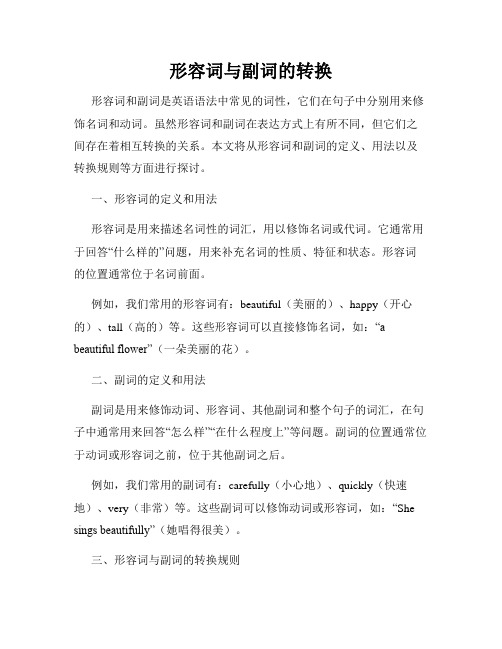
形容词与副词的转换形容词和副词是英语语法中常见的词性,它们在句子中分别用来修饰名词和动词。
虽然形容词和副词在表达方式上有所不同,但它们之间存在着相互转换的关系。
本文将从形容词和副词的定义、用法以及转换规则等方面进行探讨。
一、形容词的定义和用法形容词是用来描述名词性的词汇,用以修饰名词或代词。
它通常用于回答“什么样的”问题,用来补充名词的性质、特征和状态。
形容词的位置通常位于名词前面。
例如,我们常用的形容词有:beautiful(美丽的)、happy(开心的)、tall(高的)等。
这些形容词可以直接修饰名词,如:“a beautiful flower”(一朵美丽的花)。
二、副词的定义和用法副词是用来修饰动词、形容词、其他副词和整个句子的词汇,在句子中通常用来回答“怎么样”“在什么程度上”等问题。
副词的位置通常位于动词或形容词之前,位于其他副词之后。
例如,我们常用的副词有:carefully(小心地)、quickly(快速地)、very(非常)等。
这些副词可以修饰动词或形容词,如:“She sings beautifully”(她唱得很美)。
三、形容词与副词的转换规则形容词与副词之间的转换规则有以下几种情况:1. 形容词以“-ly”结尾时,可以直接转换成副词,无需做任何改变。
例如:quick(快的)→ quickly(快速地)2. 形容词以辅音字母+y结尾时,将y改为i,再加上“-ly”构成副词。
例如:happy(开心的)→ happily(快乐地)3. 形容词以“-le”结尾时,需要将“-le”改为“-ly”构成副词。
例如:gentle(温和的)→ gently(温和地)4. 形容词以“-ic”或“-al”结尾时,可以直接加上“-ly”构成副词。
例如:economic(经济的)→ economically(经济地)5. 部分形容词与副词形式一样,没有转换规则。
例如:fast(快的)→ fast(快速地)四、形容词和副词在句子中的应用举例下面通过一些例句来展示形容词和副词的使用方式:1. 形容词修饰名词:- He is a talented musician.(他是一位有才华的音乐家。
英语语法--形容词与副词

英语语法一形容词与副词来源:普特英语形容词1.1什么是形容词形容词(adjective)是修饰名词表示名词属性的词,常放在它所修饰的名词之前。
如:a lovely baby 一个可爱的婴儿the beautiful picture那幅美丽的图画modern history 现代历史1.2形容词的用法形容词在句中可用作:1淀语He is a good boy他是个好孩子。
The Chinese Communist Party is a great party 中国共产党是伟大的党。
2)表语The film is both moving and instructive.这部电影很感动人,而且富有教育意义。
I am very glad to see you.见到你很高兴。
3)宾语补足语和宾语一起构成复合宾语。
如:Have you got everything ready for the journey?你行装都准备好了吗?We keep our rooms clean and tidy我们经常保持房间的整洁。
4)相当于名词某些形容词前用定冠词the,变成名词化的形容词,可在句中作主语、宾语等。
如:The young are active.青年人积极好动。
(the young作主语)The blind can learn to read with their fingertips.盲人能够用指尖学习阅读书籍。
(the blind 作主语)He has a keen sense of the new他对新鲜事物有敏锐的感觉。
(the new作宾语)[注一]上述三例中的the young =the young people,the blind the Blind people,the new the new things.[注二]在The sun rose red(旭日升起)中的形容词red和Don't marry young(不要早婚)中的形容词young都是主语补足语。
四、形容词和副词

以-ue结尾 的形容词
以-l结尾 的形容词 以-ll结尾 的形容词
英语
真题链接
1.The title will be (official) given to me at a ceremony in
London.(2016全国Ⅰ)
2.If you feel stressed by responsibilities at work,you should take a step back and identify(识别) those of importance.(2016全国Ⅱ) 3.Recent studies show that we are far more productive at work if we take short breaks (regular).(2016全国Ⅱ) (great) and less
英语
考点三 形容词和副词的词形变化 1.常见的形容词后缀 形容词后缀 -able -ible 意义 例词 acceptable可接受的 available可利用的 valuable有价值的 reasonable合理的 accessible可接近的 typical典型的 digital数码的 cultural文化的 environmental环境的 frequent频繁的 convenient方便的 efficient效率高的 significant有重大意义的
这两姐妹中,玛丽更聪明。
特别提示 有时形容词最高级前不用the,句中的most 相当于 very,意为“非常,十分”。 This is a most interesting stor示最高级含义
在某个特定范围内,同类事物对比,可用以下比较级结构表示最高级
英语
四、形容词和副词
语法——形容词与副词

语法——形容词与副词第4讲形容词与副词形容词主要用来描写或修饰名词或代词,表示人或事物的性质、状态、特征、或属性。
副词是用来修饰动词、形容词、其他副词或整个句子,表示时间、地点、方式、程度、动作、频度等。
核心考点01 考查形容词和副词的基本用法当设空处所给的词是名词或动词时,如果所填的词作定语、表语、补语,表示事物的特征,需要考虑用形容词形式;当设空处是形容词时,如果所填的词修饰动词、形容词、其他副词、介词短语、名词短语或整个句子,表示时间、地点、方式、程度、动作、频度等,需要考虑用副词形式。
典例分析(2017全国卷Ⅱ)The Central London Railway was one of the most ________ (success) of these new lines, and was opened in 1900.【解析】句意:伦敦中部铁路是这些线路中最成功的一条,于1900年开通。
根据前面的the most可知, 这里是形容词的最高级, success是名词, 其形容词形式是successful。
【答案】successful状元提醒核心考点02考查形容词和副词的比较等级绝大多数形容词和副词都有三种形式:原级,比较级和最高级,用以表示形容词和副词在程度上的不同。
同级比较用“as + adj. / adv.+as”结构;其否定形式可用“not as / so + adj. / adv. + as”结构。
比较级用于两个人或事物的比较,用“比较级+than+对比成分”构成。
最高级用于两个以上的人和物进行比较,其结构形式为“the+最高级+of / in+比较的范围”。
但是,在很多情况下,比较等级的概念是暗含在上下文的语境中的,因此,考生在作答时一定要特别注意。
典例分析The purpose of new technologies is to make life ________ (easy), not to make it more difficult.【解析】句意:新技术的目的是使生活更容易,而不是使之更困难。
常见的形容词和副词

常见的形容词和副词在我们的日常生活和写作中,形容词和副词是非常常见且有用的词汇。
它们可以丰富我们的表达,使语言更加生动和精准。
本文将介绍一些常见的形容词和副词,并探讨它们的用法和作用。
一、表示人性格和外貌的形容词1. 年轻的:指某人年龄较轻,常用来形容青少年或拥有精力活力的人。
例句:她是一个年轻的教师,充满着热情和创造力。
2. 高大的:形容某人身材较高、较高大。
例句:他是一位高大的篮球运动员,高度让人畏惧。
3. 聪明的:形容某人智力较强。
例句:这个孩子非常聪明,很容易掌握新知识。
4. 可爱的:指某人或某物令人喜爱或具有吸引力。
例句:那只小猫非常可爱,大家都喜欢和它玩耍。
5. 慷慨的:形容某人乐于助人,愿意给予帮助或贡献。
例句:他慷慨地捐赠了一大笔善款用于救助灾区的人们。
二、表示程度和频率的副词1. 非常:表示程度很高,可以用来修饰形容词或动词。
例句:这本书非常有趣,我一下午都沉浸其中。
2. 比较:表示进行比较,程度中等。
例句:他的成绩比较好,但还有进步的空间。
3. 很少:表示频率很低,事情发生的可能性小。
例句:我很少去夜店,更喜欢在家里安静地阅读。
4. 经常:表示频率较高,事情发生的可能性大。
例句:他经常去健身房锻炼身体,保持健康和身材。
5. 快速地:表示某个动作迅速进行,速度很快。
例句:他快速地跑向终点,赢得了比赛的冠军。
三、表示时间和地点的副词1. 现在:表示当前的时间。
例句:我们现在正在开会,过一会儿就开始讨论下一个项目。
2. 早上:表示上午的时间段。
例句:我喜欢早上跑步,清新的空气让我感到宁静和活力。
3. 那里:表示某个地方的位置。
例句:我想去海边度假,那里的风景一定很美。
4. 这里:表示说话人所在的地方。
例句:欢迎大家来参观我们的展览,这里展示了许多珍贵的艺术品。
5. 外面:表示某个地点或房间之外。
例句:外面下着大雨,我们最好待在室内不出门。
四、表示感情和态度的形容词1. 开心的:形容某人感到愉快、快乐。
形容词和副词
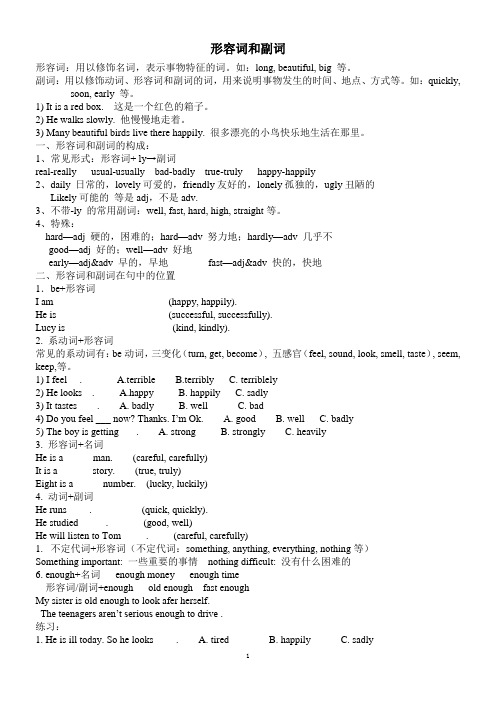
形容词和副词形容词:用以修饰名词,表示事物特征的词。
如:long, beautiful, big 等。
副词:用以修饰动词、形容词和副词的词,用来说明事物发生的时间、地点、方式等。
如:quickly, soon, early 等。
1) It is a red box. 这是一个红色的箱子。
2) He walks slowly. 他慢慢地走着。
3) Many beautiful birds live there happily. 很多漂亮的小鸟快乐地生活在那里。
一、形容词和副词的构成:1、常见形式:形容词+ ly→副词real-really usual-usually bad-badly true-truly happy-happily2、daily 日常的,lovely可爱的,friendly友好的,lonely孤独的,ugly丑陋的Likely可能的等是adj,不是adv.3、不带-ly 的常用副词:well, fast, hard, high, straight等。
4、特殊:hard—adj 硬的,困难的;hard—adv 努力地;hardly—adv 几乎不good—adj 好的;well—adv 好地early—adj&adv 早的,早地fast—adj&adv 快的,快地二、形容词和副词在句中的位置1.be+形容词I am________ (happy, happily).He is ________ (successful, successfully).Lucy is __________ (kind, kindly).2. 系动词+形容词常见的系动词有:be动词,三变化(turn, get, become), 五感官(feel, sound, look, smell, taste), seem, keep,等。
1) I feel __. A.terrible B.terribly C. terriblely2) He looks__. A.happy B. happily C. sadly3) It tastes ___ . A. badly B. well C. bad4) Do you feel ___ now? Thanks. I’m Ok. A. good B. well C. badly5) The boy is getting ___. A. strong B. strongly C. heavily3. 形容词+名词He is a _____ man. (careful, carefully)It is a ______ story. (true, truly)Eight is a _____ number. (lucky, luckily)4. 动词+副词He runs ____. (quick, quickly).He studied _____. (good, well)He will listen to Tom_____. (careful, carefully)1.不定代词+形容词(不定代词:something, anything, everything, nothing等)Something important: 一些重要的事情nothing difficult: 没有什么困难的6. enough+名词enough money enough time形容词/副词+enough old enough fast enoughMy sister is old enough to look afer herself.The teenagers aren’t serious enough to drive .练习:1. He is ill today. So he looks ____. A. tired B. happily C. sadly2. My brother doesn’t feel ___ today. A. good B. well C. happily3. The food smells ___ . I don’t like it A. good B. badly C. bad4. He writes very ____. A. careful B. carefully C. bad5. I study very____. A. hard B. hardly C. careful6. The weather gets ___. A. warm B. warmly C. coldly7. Our country is becoming ___. A. strong B. strongly C. richly8. Is there ____ in the newspaper ?A. something newB. new anythingC. anything new9. There is ___ with my bike. It works well.A. nothing wrongB. wrong somethingC. something wrong10. He speaks ____ for me to understand.A. too slowlyB. slowly enoughC. enough slowly11. He runs ___ to catch up with me.A. too fastB. quick enoughC. quickly enough12. I’m ____ I can’t say a wordA. too happy toB. happy enough thatC. so happy that13.你能给我一些吃的吗? Can you ______________________________?14.老师告诉我们一些有趣的事情. The teacher ______________________.15.他够高可以摘到那个苹果. He is _____________________ the apple.16.他工作够仔细. He works______________.17.他上课不够认真He ____________________.18.这音乐听起来很美妙. ____________________________.19. Tom 看起来不开心. ___________________________.20. 这石头太重, 我帮不动. The stone _____________________ carry.三、形容词&副词的比较级和最高级1. 原级、比较级、最高级的构成规则:1) 直接+er, +est : cold –colder –coldest high—higher—highest2) 以 e结尾的+r, +st: fine –finer—finest nice --nicer --nicest3) 以y结尾的, 改y为i, 再+er. +estEasy--easier --easiest Happy--happier -- happiest1)重读闭音节单词,双写辅音,再+er, +estbig – bigger – biggest sad--sadder—saddest thin – thinner – thinnest6) 多音节词,+more, +mostBeautiful—more beautiful—most beautifulImportant—more important—most importantDelicious—more delicious—most delicious2)不规则变化good / well – better – best ill / bad / badly – worse – worstmany / much – more – most little – less – leastfar – farther / further– farthest / furthest练习:写出下列单词的比较级和最高级small _______ _______ nice ________ _______ big ________ _________ early ______ ________ heavy _______ ______ wet _______ ________late _______ _______cold _______ _______ popular _______ _______ interesting _______ _______old _______ ______ much _______ ______red _______ ______ good _______ ______2. 形容词、副词比较等级的用法与句型:1) 原级:表示两者一样或不一样结构:as + 原级+as not as/so + 原级+asMy friend Kay is as tall as me.My friend Ka y isn’t as/ so tall as me.Exercises:①Joan与Kate一样小心. Joan is _________________ Kate.②我与你学习一样努力。
形容词与副词
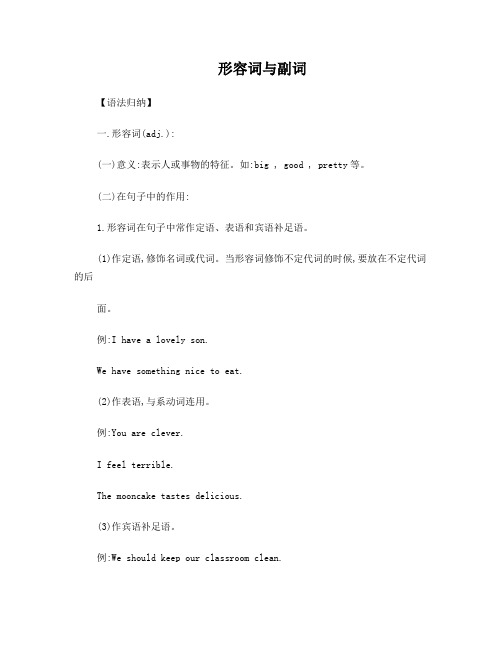
形容词与副词【语法归纳】一.形容词(adj.):(一)意义:表示人或事物的特征。
如:big , good , pretty等。
(二)在句子中的作用:1.形容词在句子中常作定语、表语和宾语补足语。
(1)作定语,修饰名词或代词。
当形容词修饰不定代词的时候,要放在不定代词的后面。
例:I have a lovely son.We have something nice to eat.(2)作表语,与系动词连用。
例:You are clever.I feel terrible.The mooncake tastes delicious.(3)作宾语补足语。
例:We should keep our classroom clean.2.特殊的形容词:(1)ill和well表示身体健康的时候,只能作表语,不作定语。
例:The boy was ill .不能说:He was an ill boy.The girl looks very well.不能说:She is a well girl.(2)以ly结尾的形容词,不要认为是副词。
如:friendly, lonely , lively二.副词(adv.)(一)意义:(修饰动词、形容词或其他副词)表示时间、地点、方法或程度等。
如:very , quite , slowly等。
(二)种类:1. 时间副词:now, then, ago , tomorrow2. 地点副词:here, there, outside, everywhere3. 方式副词:slowly, happily, angrily4.程度副词:almost, hardly, nearly5.疑问副词:how, why, where, when6.频度副词:always, often , usually(三)副词在句子中的位置:一般情况下,时间副词和地点副词的位置通常在句末,二者同时出现时,先地点后时间。
形容词和副词
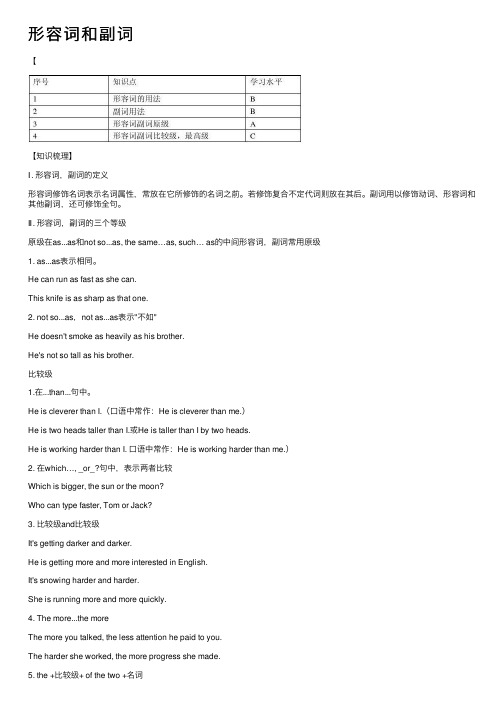
形容词和副词【【知识梳理】Ⅰ. 形容词,副词的定义形容词修饰名词表⽰名词属性,常放在它所修饰的名词之前。
若修饰复合不定代词则放在其后。
副词⽤以修饰动词、形容词和其他副词,还可修饰全句。
Ⅱ. 形容词,副词的三个等级原级在as...as和not so...as, the same…as, such… as的中间形容词,副词常⽤原级1. as...as表⽰相同。
He can run as fast as she can.This knife is as sharp as that one.2. not so...as,not as...as表⽰"不如"He doesn't smoke as heavily as his brother.He's not so tall as his brother.⽐较级1.在...than...句中。
He is cleverer than I.(⼝语中常作:He is cleverer than me.)He is two heads taller than I.或He is taller than I by two heads.He is working harder than I. ⼝语中常作:He is working harder than me.)2. 在which…, _or_?句中,表⽰两者⽐较Which is bigger, the sun or the moon?Who can type faster, Tom or Jack?3. ⽐较级and⽐较级It's getting darker and darker.He is getting more and more interested in English.It's snowing harder and harder.She is running more and more quickly.4. The more...the moreThe more you talked, the less attention he paid to you.The harder she worked, the more progress she made.5. the +⽐较级+ of the two +名词The taller of the two boys is my brother.最⾼级1.表⽰三者或三者以上,通常含有in,of介词短语和定语从句的句⼦Spring is the best season in the north.John is the cleverest of all the boys.This is the best book that I've ever read.He sings (the) best in the class.She jumps highest of the three.2. 在which… , _or_?句中,表⽰三者或三者以上⽐较Which is the biggest, the sun, the moon or the earth?Who can type fastest, Tom, Jack or Mary?3. 形容词最⾼级表⽰“最...之⼀”时,可⽤“one of the+最⾼级+复数名词”Edison was one of the greatest inventors in the world.4. 形容词最⾼级的前⾯有my等形容词性物主代词,名词所有格时不⽤加the.This is my busiest day.The Changjiang River is China's longest river.5. ⽐较级句式表达最⾼级的意思She is taller than any other girl in her class.She is taller than the other girls in her class.She is taller than anyone else in her classShe is taller than any of the other girls in her class.She is taller than the rest of the girls in her class.否定词+⽐较级=最⾼级I have never heard such a better voice.No other river is longer than the Changjiang River in Asia.No doctor is as excellent as Tom’s father.6. ⽐较级,最⾼级前可受much,far,still,no,even,any, rather,a lot, a little, a great deal, by far, a bit等修饰,表⽰超出的程度We have a much better life now.The buildings look far uglier in London than here.The student study even harder than before.I made a lot more mistakes than you (did).Your cake is a little sweeter than mine.It's still hotter today.Have you any more?Oh, sorry, no more.She's no better yet.The train is no longer in sight.You must work much more carefully.You can read even better if you try your best.They will come back a little earlier.Helen came late, but her sister came still later.I am so tired. I can't walk any farther.My brother is rather better today.7.rather ,much, very much, far 修饰⽐较级,最⾼级的区别rather 的后⾯可以接原级,也可以接⽐较级:rather good ,rather tired ,rather formallyThis hat is rather more expensive than that one.much 可以接⽐较级,也可以接最⾼级。
小学英语语法——形容词与副词知识点讲解+练习

形容词和副词一、形容词、副词概述1、形容词定义:形容词(adjective),简称adj,用来修饰名词或代词,表示人或事物的性质、状态和特征。
2、副词定义:副词(adverb),简称adv,用来修饰动词、形容词或副词,表示时间、频率、范围、语气、程度等。
二、形容词、副词考点纵览三、综合练习( ) 1. How beautifully she sings! I have never heard _____ voice.A. a betterB. a bestC. the betterD. the best ( ) 2. She looks very _____ but I can’t remember her name.A. similarB. familiarC. friendlyD. strange ( ) 3. Children all looked _____ at the broken model plane and felt quite _____.A. sad; sadB. sadly; sadlyC. sad; sadlyD. sadly; sad( ) 4. The child dreamed that he had once lived in a _______ house in the forest.A. wooden pretty littleB. little pretty woodenC. pretty little woodenD. wooden little pretty( ) 5. ---Which team is _______ to win the game?---I don’t know, but I’ve found _______ for ours to win.A. probable; it unlikelyB. likely; it possibleC. possible; it possibleD. likely; it possibly( ) 6. With the development of the Internet, _______ communication is done by regular mail.A. lessB. moreC. littleD. few( ) 7. ---If you don’t like the red coat, take the blue one.---OK, but do you have ______ size in blue? This one’s a bit tight for me.A. a bigB. a biggerC. the bigD. the bigger( ) 8. If there were no examinations, we should have ______ at school.A. the happiest timeB. a more happier timeC. much happiest timeD. a much happier time( ) 9. This dress is prettier, but it costs ______ that one.A. twice more thanB. twice as much asC. as much twice asD. twice so much as( ) 10.________students are required to take part in the boat race.A. Ten strong young ChineseB. Ten Chinese strong youngC. Chinese ten young strongD. Young strong ten Chinese( ) 11. Allen had to call a taxi because the box was ____to carry all the way home.A. much too heavyB. too much heavyC. heavy too muchD. too heavy much( ) 12. Our neighbor has ________ours.A. as a big house asB. as big a house asC. the same big house asD. a house the same big as( ) 13. We were in ________when we left that we forgot the airline tickets.A. a rush so anxiousB. a such anxious rushC. so an anxious rushD. such an anxious rush( ) 14. ---I was riding along the street and all of a sudden, a car cut in and knocked me down.---You can never be ________careful in the street.A. muchB. veryC. soD. too( ) 15. ---You don’t look very ________.Are you ill?---No,I’m just a bit tired.A. goodB. wellC. strongD. healthy( ) 16. Four of Robert’s children were at the party,including ________, Luke.A. the eldestB. an oldest oneC. the oldD. an old one( ) 17. Many students signed up for the ________race in the sports meeting to be held next week.A. 800-metre-longB. 800-metres-longC. 800 metre lengthD. 800 metres length( ) 18. It’s always difficult being in a foreign country,________if you don’t speak the language.A. extremelyB. naturallyC. basicallyD. especially( ) 19. In recent years,travel companies have succeeded in selling us the idea that the further we go,__________.A. our holiday will be betterB. our holiday will be the betterC. the better our holiday will beD. the better will our holiday be( ) 20. When he heard a cry for help, he ran out as ________ as he could.A. hardlyB. quicklyC. finallyD. slowly( ) 21. “Our team is _____ to win the match.” “Really? But I don’t think so.”A. easyB. difficultC. possibleD. sure( ) 22. A ______ road goes ______ from one place to another.A. straight; straightB. straightly; straightlyC. straight; straightlyD. straightly; straight( ) 23. “This book is ______ more useful for us students.” “Yes, but it is _______ too difficult.”A. quite; quiteB. much; ratherC. rather; quite D quite; much( ) 24. There was a ______ change in the weather, and the rain came pouring down.A. quickB. slowC. fastD. sudden( ) 25. You can speak ______ in front of him, but you can’t eat ______ in his restaurant.A. freely; freelyB. free; freelyC. freely; freeD. free; free( ) 26. Tom will not be at the picnic, ______ to the family’s disappointment.A. muchB. moreC. too muchD. much more( ) 27. --- I have seen so little of Mike ______. Is he away on business?--- Oh, no. He just leaves for his office early and comes back very ______.A. later; latelyB. later; laterC. lately; lateD. late; lately( ) 28. From his ______ voice on the phone I know everything is well under way.A. satisfactoryB. satisfyingC. satisfiedD. satisfaction( ) 29. In ______ Chinese culture, marriage decisions were often made by parents for their children.A. traditionalB. historicC. peacefulD. civil( ) 30. The houses in the village are ______ built of wood and hay.A. mostB. almostC. nearlyD. mostly( ) 31. --- What do people wear when they go to the theatre?--- Well, it isn’t very ______. People can wear anything they like.A. normalB. certainC. modernD. simple( ) 32. Mary’s biology is ______ than ______ in the class.A. a lot of better; anyone else’sB. far better; anyone’s else’sC. much better; anyone elseD. a lot better; anyone else’s( ) 33. We decided not to climb the mountains because it was raining ____.A. badlyB. hardlyC. stronglyD. heavily( ) 34. Paris is one of _____ cities in the world.A. more beautifullyB. more beautifulC. the most beautifullyD. the most beautiful ( ) 35. Are you going to leave______?A. the open windowsB. the windows openingC. the windows openD. the windows opened( ) 36. Bob never does his homework _____ Mary, so he makes lots of mistakes.A. so careful asB. as carefully asC. carefully asD. as careful as.( ) 37. My sister is good at sports. She can jump ____ than me.A. highestB. very highC. too highD. much higher ( ) 38. When spring comes, the trees get ____.A. green and greenB. green and greenerC. greener and greenD. greener and greener( ) 39.He works very ___________.He _____________has a rest on Sundays.A. hard; hardlyB. hardly; hardC. hard; hardD. hardly; hardly( ) 40.He learns Russian_____________.A. goodB. niceC. wellD. fine( ) 41.The boy didn’t run______________ to catch the bus.A. fast enoughB. enough fastC. quick enoughD. enough quickly ( ) 42.Eating _____________ is bad for our health.A. much tooB. too muchC. too moreD. too many( ) 43.Have you ever seen ______________ big panda before?A. a suchB. such aC. so aD. as( ) 44.He looks very _____________ today.A. worriedB. worryC. worryingD. to worry( ) 45.Listen to me. I have _____________ to tell you.A. important somethingB. important anythingC. something importantD. anything important( ) 46. ---How ___ can you finish the drawing?--- In ten minutes.A. longB. often.C. soonD. rapid( ) 47. This book is _____ worth seeing again.A. veryB. quiteC. wellD. much( ) 48. My _____ brother is three years ____ than I .A. old; olderB. elder; olderC. older; elderD. old; elder( ) 49. We felt ___ after we watched the ___ football match.A. exciting; excitedB. excited; excitingC. excited; excitedD. exciting; exciting( ) 50. The old man lived ____ in the house, but he didn’t feel___.A. lonely; lonelyB. alone; lonelyC. alone; aloneD. lonely; alone小学英语语法——形容词与副词知识点讲解+练习参考答案1. A2.B3.D4.C5.B6.A7.B8.D9.B 10.A 11. A 12.B 13.D 14.D 15.B 16.A 17.A 18.D 19.C 20.B 21. D 22.A 23.B 24.D 25.C 26.A 27.C 28.C 29.A 30.D 31. B 32.D 33.D 34.D 35.C 36.B 37.D 38.D 39.A 40.C 41. A 42.B 43.B 44.A 45.C 46.C 47.C 48.B 49.B 50.B11。
英语中形容词和副词的用法

英语中形容词和副词的用法一、形容词形容词主要用来说明或修饰名词或代词,增加或补充其含义,从而限制或缩小其适用的范围。
表示人或事物的性质、状态和特征。
形容词可在句中充当定语修饰名词、代词,也可作表语表示主语的状态、特征,也可作补语、状语。
作定语:He is a very good swimmer.作表语:He looks very healthy.作宾语补足语:The rain made the ground wet.作主语补足语:She was considered smart.作主语或宾语:The old are respected here and there.The new replaces the old.作状语:Tired and hot, we had to stop to have a break.二、副词副词主要修饰动词、形容词或其他副词,有时也可用来修饰全句。
说明时间、地点、方式、程度等概念。
作状语:It's raining heavily.修饰形容词:It's rather a difficult job.修饰介词短语:The arrow hit the apple right in the middle.修饰从句:This is exactly what she said.修饰名词、代词及数词:Life here is full of joy.She is going to extend her stay there for about two weeks. Nearly everybody came to party.作表语:The class is over.作介词宾语:Who is calling me from downstairs?作定语:Are you content with the life here?作补语:We were shown by the young man.。
英语语法--形容词与副词

英语语法——形容词与副词来源:普特英语形容词1.1 什么是形容词形容词(adjective)是修饰名词表示名词属性的词,常放在它所修饰的名词之前。
如:a lovely baby一个可爱的婴儿the beautiful picture那幅美丽的图画modern history现代历史1.2 形容词的用法形容词在句中可用作:1)定语He is a good boy.他是个好孩子。
The Chinese Communist Party is a great party.中国共产党是伟大的党。
2)表语The film is both moving and instructive.这部电影很感动人,而且富有教育意义。
I am very glad to see you.见到你很高兴。
3)宾语补足语和宾语一起构成复合宾语。
如:Have you got everything ready for the journey? 你行装都准备好了吗?We keep our rooms clean and tidy.我们经常保持房间的整洁。
4)相当于名词某些形容词前用定冠词the,变成名词化的形容词,可在句中作主语、宾语等。
如:The young are active.青年人积极好动。
(the young作主语)The blind can learn to read with their fingertips. 盲人能够用指尖学习阅读书籍。
(the blind作主语)He has a keen sense of the new.他对新鲜事物有敏锐的感觉。
(the new作宾语)[注一]上述三例中的the young = the young people,the blind the Blind people,the new the new things.[注二]在The sun rose red(旭日升起)中的形容词red和Don't marry young(不要早婚)中的形容词young都是主语补足语。
英语形容词和副词
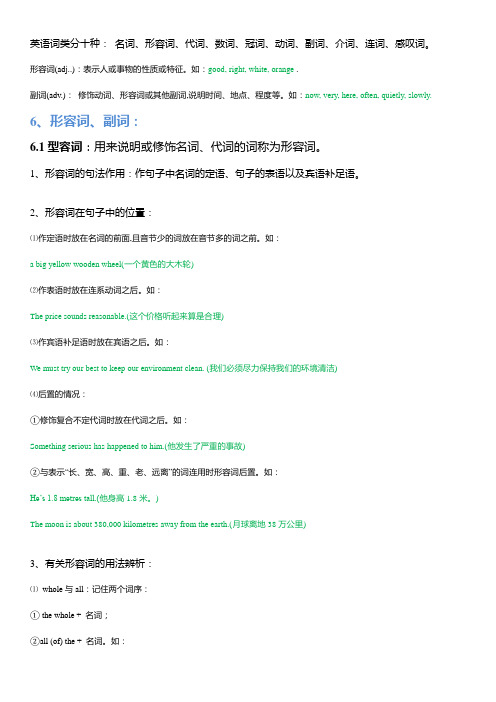
英语词类分十种:名词、形容词、代词、数词、冠词、动词、副词、介词、连词、感叹词。
形容词(adj..):表示人或事物的性质或特征。
如:good, right, white, orange .副词(adv.):修饰动词、形容词或其他副词,说明时间、地点、程度等。
如:now, very, here, often, quietly, slowly.6、形容词、副词:6.1型容词:用来说明或修饰名词、代词的词称为形容词。
1、形容词的句法作用:作句子中名词的定语、句子的表语以及宾语补足语。
2、形容词在句子中的位置:⑴作定语时放在名词的前面,且音节少的词放在音节多的词之前。
如:a big yellow wooden wheel(一个黄色的大木轮)⑵作表语时放在连系动词之后。
如:The price sounds reasonable.(这个价格听起来算是合理)⑶作宾语补足语时放在宾语之后。
如:We must try our best to keep our environment clean. (我们必须尽力保持我们的环境清洁)⑷后置的情况:①修饰复合不定代词时放在代词之后。
如:Something serious has happened to him.(他发生了严重的事故)②与表示―长、宽、高、重、老、远离‖的词连用时形容词后置。
如:He‘s 1.8 metres tall.(他身高1.8米。
)The moon is about 380,000 kilometres away from the earth.(月球离地38万公里)3、有关形容词的用法辨析:⑴whole与all:记住两个词序:① the whole + 名词;②all (of) the + 名词。
如:He was busy the whole morning.(整个早晨他都很忙)He can remember all the words he learns.(他能记住学过的所有单词)⑵tall与high, short与low:指人的个子时用tall与short;指其他事物时一般用high与low。
形容词和副词

形容词、副词1、形容词:用来说明或修饰名词、代词的词称为形容词。
1、形容词的句法作用:作句子中名词的定语、句子的表语以及宾语补足语。
2、形容词在句子中的位置:⑴作定语时放在名词的前面,且音节少的词放在音节多的词之前。
如:abig yellow wooden wheel(一个黄色的大木轮)⑵作表语时放在连系动词之后。
如:The price soundsreasonable.(这个价格听起来算是合理)⑶作宾语补足语时放在宾语之后。
如:We must try our best to keepour environment clean.(我们必须尽力保持我们的环境清洁)⑷后置的情况:①修饰复合不定代词时放在代词之后。
如:Something serious hashappened to him.(他发生了严重的事故)②与表示“长、宽、高、重、老、远离”的词连用时形容词后置。
如:He’s 1.8 metres tall.(他身高1.8米。
)The moon is about380,000 kilometres away from the earth.(月球离地38万公里)3、有关形容词的用法辨析:⑴whole与all:记住两个词序:①the whole + 名词;②all (of)the + 名词。
如:He was busy the whole morning.(整个早晨他都很忙) / He can remember all the words he learns.(他能记住学过的所有单词)⑵tall与high, short与low:指人的个子时用tall与short;指其他事物时一般用high与low。
如:He’s very tall/short.(他个子高/矮) / Tall trees are standing on both sides of that avenue.(大道的两侧有高大的树木) / A few people live on highmountains.(少量的人住在高山上)⑶ real与true:real一般指东西的真假,译为“真的”;而true则指事情或消息的可靠性,译为“真实的”。
形容词和副词

作不定代词someone, something, somebody; anyone, anything, anybody, everyone, everything everybody; nothing, no one nobody的定语时,定于后置
10.This is a__________clock .
A.nice Swiss little
B.nice little Swiss
C.little nice Swiss
D.Swiss nice little
11.She spent___________time studying French.
A.much so B. so much C.such much D.so many
12.----Which do you find_____to learn,Japanese or
English?
----English.
A.easy B.easier C.more easily D.it much easier
13.Of the two oceans,the Pacific is_______.
那汤尝起来很不错
2)有些形容词是以-ly结尾的,我们容易把它们误 认为是副词
如: lovely(可爱的),friendly(友好的) ,orderly(有 序的),slightly(悦耳的),motherly(母亲般的), sisterly(姐妹般的),brotherly(兄弟般的)。
She looks lovely.她看上去很漂亮 3. 宾语的补足语 形容词作宾语补足语即与宾语一起构成复合
形容词和副词的归纳
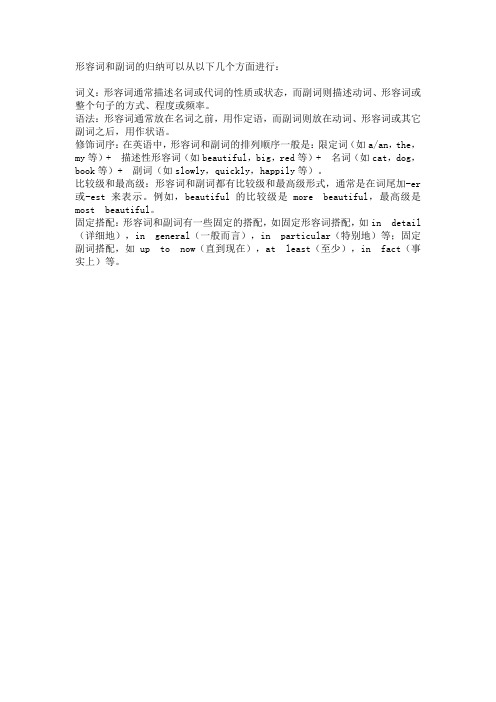
形容词和副词的归纳可以从以下几个方面进行:
词义:形容词通常描述名词或代词的性质或状态,而副词则描述动词、形容词或整个句子的方式、程度或频率。
语法:形容词通常放在名词之前,用作定语,而副词则放在动词、形容词或其它副词之后,用作状语。
修饰词序:在英语中,形容词和副词的排列顺序一般是:限定词(如a/an,the,my等)+ 描述性形容词(如beautiful,big,red等)+ 名词(如cat,dog,book等)+ 副词(如slowly,quickly,happily等)。
比较级和最高级:形容词和副词都有比较级和最高级形式,通常是在词尾加-er 或-est来表示。
例如,beautiful的比较级是more beautiful,最高级是most beautiful。
固定搭配:形容词和副词有一些固定的搭配,如固定形容词搭配,如in detail (详细地),in general(一般而言),in particular(特别地)等;固定副词搭配,如up to now(直到现在),at least(至少),in fact(事实上)等。
形容词副词的区别和用法

形副同形词有哪些?
1、Well 形容词性意思:身体好的 副词性意思:好地
2、Fast 形容词性意思:快的 副词性意思:快地
3、Early 形容词性意思:早的 副词性意思:早早地
4、Hard 形容词性意思:难的,硬的 副词性意思:勤奋地 衍生词:Hardly 几乎不
5、Late 形容词性意思:晚的 副词性意思:晚地 衍生词:Lately 最近
6、Near 形容词性意思:近的 副词性意思:近地 衍生词:Nearly 几乎
7、High 形容词性意思:高的 副词性意思:高地 衍生词:Highly 高度地
什么是副词?
副词是用来修饰动词、形容词或全句的词。说明时间、地点、 程度、方式等概念。它是对描述一件事物的补充。
Now, I `m writing a letter. He never eats hamburgers. Will, Mike and William played basketball here yesterday.
副词的分类
1.时间副词————————决定这个句子用什么时态
now today, yesterday, tomorrow, before, soon, early …
2.地点副词————————表示事情发生的地点
Here, there, everywhere, anywhere, in, out, inside, outside, above, below, down, back, forward, home, along, round, around,near, off,past, up, away…
- 1、下载文档前请自行甄别文档内容的完整性,平台不提供额外的编辑、内容补充、找答案等附加服务。
- 2、"仅部分预览"的文档,不可在线预览部分如存在完整性等问题,可反馈申请退款(可完整预览的文档不适用该条件!)。
- 3、如文档侵犯您的权益,请联系客服反馈,我们会尽快为您处理(人工客服工作时间:9:00-18:30)。
英语句子副词用法说明1.句子副词的特点句子副词用于修饰句子(而不是修饰某个单词),反映说话人的观点和看法,如actually, certainly, clear ly, definitely, evidently, fortunately, frankly, honestly, luckily, obviously, perhaps, possibly, probably, surel y, undoubtedly, unexpectedly 等。
(from )2.句子副词在句中的位置句子副词通常位于句首(或分句句首):Obviously he can’t tell the difference between them. 显然他无法区别两者的不同。
I arrived late but luckily the meeting had been delayed. 我迟到了,幸而会议推迟了。
但有些句子副词也可以出现在句中:He smiled nastily. He evidently knew something I didn’t. 他发出狞笑,他显然知道一些我所不知道的事。
3.句子副词与其他副词的用法比较有的句子副词也可用作其他种类的副词,不过这往往会导致位置和语义的变化:Clearly he didn’t say so. 显然他没有这样说。
(句子副词)He didn’t say so clearly. 他说得没有那么清楚。
(方式副词)Frankly, you are wrong. 说实在的,你错了。
(句子副词)He spoke frankly about his past life. 他坦率地谈了他过去的生活。
(方式副词)英语副词的句法功能1.用作状语Look at the photo carefully. 仔细看看这张照片。
You’re driving too fast. 你开车开得太快了。
2.用作表语The meeting is over. 会议结束了。
Is anyone upstairs? 楼上有人吗?Is the radio on or off? 收音机是开着的还是关着的?【注】在通常情况下,用作表语时不用副词而用形容词,如可说The woman is beautiful. 而不说The woman is beautifully. 可说The cloth feels soft. 不能说The cloth feels softly. 英语中用作表语的副词主要是表地点的副词以及某些与介词同形的副词,而且只能用于连系动词be 后作表语,而不用于其他连系动词后作表语,如可说He is here 或He is abroad,但不能说He seems here 或He seems abroad。
(from )3.用作宾语It’s hot in here. 这里面很热。
It’s not far from here. 从这儿去不远。
I’ll stay at home tonight. 今晚我将呆在家里。
【注】副词用作宾语的用法十分有限,通常只用作介词宾语,并且只限于某些表示时间和地点的副词,而且不同的副词有不同的搭配特点,如here和there 可与along, around, down, from, in, near, round, up 等介词连用,但通常不与介词to连用,如不说come to here, go to there 等(注:from here to there是例外),而表地点的副词abroad 则只与介词from连用,不与其他介词连用。
4.用作宾语补足语Ask him in, please. 请叫他进来。
We must try to help him through. 我们必须设法帮他渡过难关。
Sorry to have kept you up so late. 对不起,让你这么晚不能睡觉。
【注】一般说来,能用作表语的副词都可用作宾语补足语:He went to see her but found that she was out. 他去看她,但发现她不在家。
He went to see her but found her out. 他去看她,但发现她不在家。
5.用作定语The people there were very friendly. 那儿的人很友好。
Do you know the people downstairs? 你认识楼下的人吗?The shops around are very cheap. 附近商店的东西很便宜。
【注】在通常情况下,副词用作定语总是放在被修饰名词之后,若置于修饰名词之前,则通常被视为形容词,如the upstairs room和the room upstairs 都表示―楼上的房间‖,但前者的upstairs 前置,为形容词;后者的upstairs后置,为副词;又如the above passage 和the passage above都可表示―上面的段落‖,但前者的above 前置,为形容词;后者的above后置,为副词。
使用关系副词应注意的三点关系副词用于引出定语从句,主要有when, where, why。
如:Sunday is the day when very few people go to work. 星期日是没什么人上班的日子。
That’s the reason why he dislikes me. 这就是他不喜欢我的原因。
Do you know a shop where I can find sandals? 你知道哪家商店我能找到凉鞋吗?【注】关系副词用于引出定语从句,且在从句中用作状语。
关系副词when 表示时间,where表示地点,why表示原因。
(from )使用关系副词的注意点1.how 不能用作关系副词,不要想当然地将how用作关系副词置于the way 后表示方式:他说话就是那个样子。
误:This is the way how he spoke.正:This is how he spoke. / This is the way (that, in which) he spoke.2.关系副词when和where既可引导限制性定语从句,也可引导非限制性定语从句,但why只能引导限制性定语从句,不能引导非限制性定语从句(若引导非限制性定语从句,可用for which reason)。
3.引导定语从句时,when 的先行词为时间,where的先行词为地点,why的先行词为原因(主要是the reason),但是反过来却不一定:Don’t forget the time (that) I’ve told you. 不要忘记我告诉你的时间。
This is the house (that) he bought recently. 这就是他最近买的那座房子。
Please tell me the reason (that) you know. 请告诉我你所知道的原因吧。
more than 与less than的用法比较1.more than 的主要用法是:①(指数量)多于:I’ve known him for more than twenty years. 我已认识他20多年了。
②不只是,不仅仅是(通常后接名词、动词、从句等):He is more than a father to her. 他待她胜过父亲。
He more than smiled, but laughed. 他不只是微笑,而是放声大笑。
The result was much more than I imagined. 结果远远超过我的想像。
③极其,非常(通常后接形容词、副词或分词等):She was more than kind to us. 她对我们很友好。
He was more than upset by the accident. 这个意外事故使他非常心烦意乱。
④难以,完全不能(其后通常连用情态动词can):That is more than I can tell (=I can’t tell that). 那事我实在不明白。
2.less than 的主要用法是:①(指数量)不到,不足:It’s less than a mile to the station. 去车站不到一英里。
In less than an hour he finished the work. 没要上一个小时他就做完了工作。
②比…(小)少:Two is less than Three. 二比三小。
She eats less than she should. 她吃得比她应该吃的少。
③一点也不:He was less than helpful when we arrived. 我们到达时他一点也不帮忙。
3.more …than 与less…than(1)more...than 的主要用法:①比…多,比…更:He has more books than me. 他的书比我多。
He is more careful than the others. 他比其他人更仔细。
②与其…不如:He is more lucky than clever. 与其说他聪明,不如说他幸运。
He is more (a) scholar than (a) teacher. 与其说他是位教师,不如说是位学者。
【注】该句型主要用于同一个人或物在两个不同性质或特征等方面的比较,其中的比较级必须用加m ore的形式,不能用加词尾-er 的形式。
(from )(2)less...than 的主要用法是:①不像(如):He is less honest than his brother. 他不如他哥哥诚实。
②比…少,不如…多:We drink less coffee than tea. 我们喝咖啡不如喝茶多。
I got less money than the others did. 我比别人得到的钱少。
③与其…不如…:I regard him less as my teacher than as my friend. 与其说我把他当作老师,不如说我是把他当作朋友。
【注】表示此义时可与more…than结构替换(但要注意词序的变化):He is less a teacher than an expert. / He is more an expert than a teacher. 与其说他是老师,不如说他是专家。
the用作副词的三种用法以下用法的the有人认为是冠词,也有人认为是副词:1.用于最高级前Of all her friends, she likes Mary best. 在她所有的朋友中,她最喜欢玛丽。
